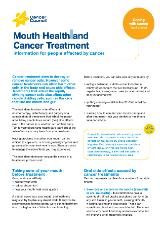Mouth sores
Chemotherapy and radiation therapy can damage the cells lining the mouth and digestive tract, leading to ulcers and infections. This is known as oral mucositis. A sore can form on any soft tissue in your mouth, and make it painful to eat and swallow.
Your doctor can give you medicines to reduce pain and discomfort when you eat or drink. Some medicines can be applied directly to the mouth sores to numb them.
To reduce discomfort, eat softer foods. You may need to avoid hot, cold, salty, spicy or acidic foods and drinks. Mucositis usually gets better a few weeks or months after treatment ends.
→ READ MORE: Managing constipation
Podcast for people affected by cancer
Listen now
Jacqueline Baker, Senior Oncology Dietitian, Chris O’Brien Lifehouse, NSW; Lauren Atkins, Advanced Accredited Practising Dietitian, OnCore Nutrition, VIC; Dr Tsien Fua, Head and Neck Radiation Oncology Specialist, Peter MacCallum Cancer Centre, VIC; Rosemerry Hodgkin, 13 11 20 Consultant, Cancer Council WA; Clare Hughes, Manager, Nutrition Unit, Cancer Council NSW; John Spurr, Consumer; Emma Vale, Senior Dietitian, GenesisCare, SA; David Wood, Consumer.
View the Cancer Council NSW editorial policy.
View all publications or call 13 11 20 for free printed copies.
Need to talk?
Support services
Exercise and cancer
Exercise has many benefits both during and after cancer treatment, helping with side effects, speeding up recovery, and improving quality of life
Looking for transport, accommodation or home help?
Practical advice and support during and after treatment
Cancer information
Relaxation and meditation
Learn how relaxation and meditation can help you both during and after cancer treatment, or listen to our relaxation and meditation audio tracks
Cancer treatment
Learn about the different treatments that are used to treat cancer, such as surgery, chemotherapy, radiation therapy and targeted therapy
